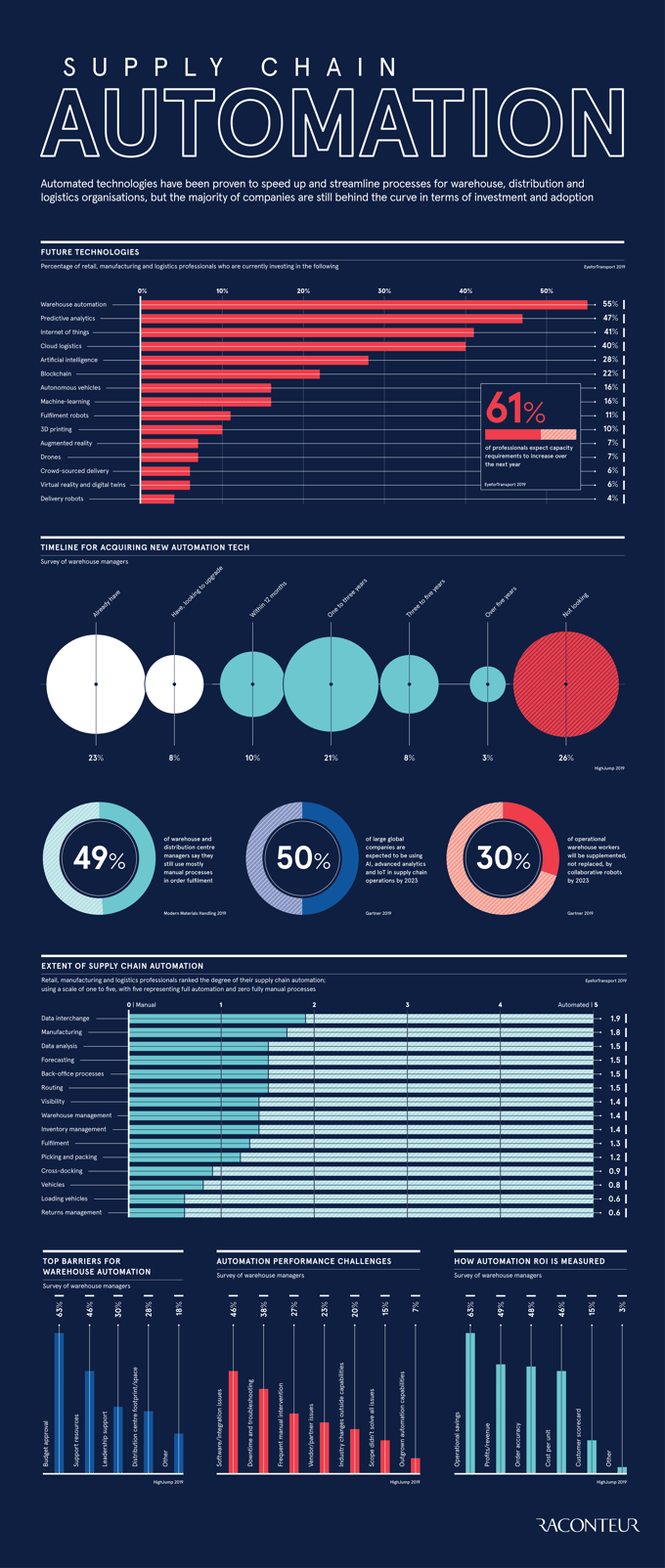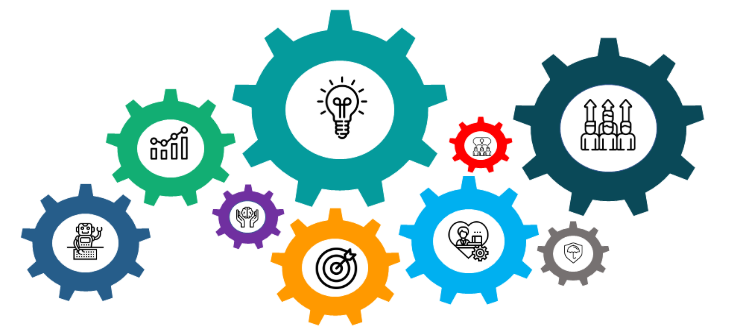Sign Up for Our
Updates
Back in 2017, ISG's Automation Index™ Report predicted that 72% of companies worldwide would be using Robotics Process Automation (RPA) by 2019. As of 2021, the results are mixed.
From Gartner, we understand that the finance industry has matched this projection, with more than 70% of companies either piloting or actively using RPA. The retail and technology sectors in Latin America have also come close, with 64% using RPA to streamline processes. However, in other parts of the world, the retail sector is lagging behind; specifically, in warehouses and distribution centres.
While early adopters of supply chain automation in warehousing, logistics, and distribution centres have demonstrated significant improvements in their processes' speed, accuracy, and efficiency, research from Raconteur has revealed that many companies in the industry are lagging behind.

According to Raconteur, the most significant barriers to warehouse automation are budget concerns, lack of resources, and lack of leadership support. However, an examination of the wide-ranging benefits of RPA in supply chain automation makes it clear that these are surmountable challenges, not impassable roadblocks.
1. RPA Improves Overall Efficiency in Warehouse Management
RPA can be deployed across a range of processes in a Warehouse Management System (WMS). Since every facility faces its own unique set of opportunities and challenges, a customised approach is ideal for deploying RPA and other forms of automation. This ensures you can integrate every process into an efficient end-to-end system.
The key areas of warehouse management that can benefit from RPA include:
- Finance and payment processing
- Order processing
- Inventory management
- Email and SMS notifications
- Communication with suppliers and customers
- Import and export tariffs, road taxes, and the like
- Shipment scheduling and tracking
- Service reminders for warehouse equipment
2. RPA Can Streamline Electronic Data Interchange
Electronic Data Interchange (EDI) is already a step up from the old paper-based approach. However, with the introduction of RPA, profound benefits can be gained.
Invoice payments and purchase orders are central to supply chain management, but when the processes surrounding them are manual, errors and missed steps are inevitable. Even just the process of setting up an EDI account for a supplier tends to require multiple manual steps, and if a single one is missed, this can lead to delayed payments or shipments – neither of which are suitable for business continuity.
By switching the complex processes involved in EDI from manually driven to RPA driven, companies can significantly reduce supply chain downtime by cutting out the errors and failures inherent to the manual system. RPA bots can run 24 hours a day if required, reading emails, processing information, setting up accounts, and following any other steps they've been taught. They can even notify suppliers and relevant team members of any important updates.
3. RPA Facilities Flawless Inventory Management
Throughout the receiving, picking, and shipping process, there is a huge scope for small errors that can have massive consequences. By incorporating RPA into your WMS, you gain access to advanced process controls and auditing capabilities. These functions allow you to ensure that human workers head to the correct location in the facility, select the right item and the correct quantity – every time, without fail.
In this way, RPA can help you eliminate human inventory errors. By deploying software bots as part of a hybrid automation methodology, you can also integrate other forms of automation, including robotics and automated material handling (AMH) systems. Both robotics and AMH can improve accuracy and productivity by facilitating batch picking and other time-saving processes.
In a world still dealing with the impacts of COVID-19, these gains in efficiency can help companies manage the increased demand for e-commerce orders and the need for social distancing in the workplace.
4. RPA Can Speed Up the Fulfillment Process
Across all industries, the order fulfilment process is composed of a chain of actions that must be executed swiftly and without error for the customer to receive their goods on time. While this process is methodical and rule-based, humans are prone to misreading numbers and forgetting steps, meaning even the most efficient and productive team will make mistakes from time to time.
RPA is nowhere more at home than in the rule-based environment of the fulfilment process. Software bots never get tired, hungry, distracted, or otherwise under the weather. They execute every step with rapid and flawless precision, allowing you to improve your turnaround times for order fulfilment and offer a reliable service to customers.
By eliminating the human errors that lead to late or unfilled orders, you're able to improve customer relations, reduce the risk of losing customers, and avoid lost revenue and reputation damage. This has a range of positive flow-on effects, including reducing the burden on your customer service team.
The future of RPA in supply chain management
The best RPA tools offer user-friendly software solutions that can be deployed 24/7 or on an as-needed basis. As part of a Hybrid Automation™ approach, RPA can automate key aspects of supply chain management, reducing the scope for errors and mishaps. However, the aspect of RPA that we love the most at Alphalake Ai is that it allows organisations to automate tasks, not jobs.
The human employees who work alongside software bots are able to focus on brainstorming, problem-solving, and other high-value activities, while the bots take care of monotonous, error-prone tasks that otherwise absorb a great deal of mental bandwidth.
By overcoming the barriers to adoption, RPA specifically, and Hybrid Automation™
in general, we are set to make profound improvements in productivity, accuracy, and efficiency in supply chain management.
If you're interested in learning more about supply chain automation or the best approach for overcoming the barriers to entry in your organisation, feel free to get in touch with Alphalake Ai's friendly customer service team.




